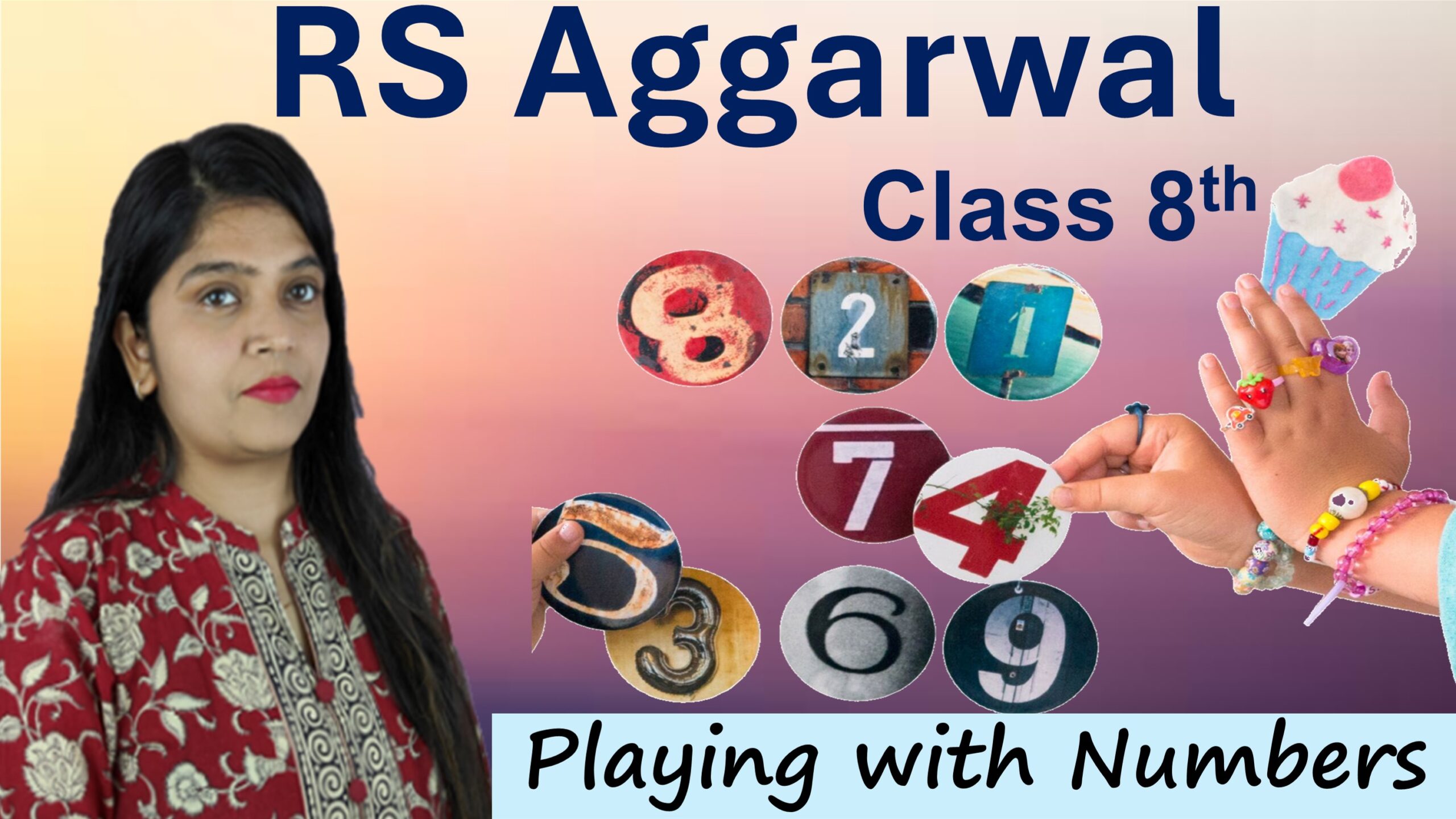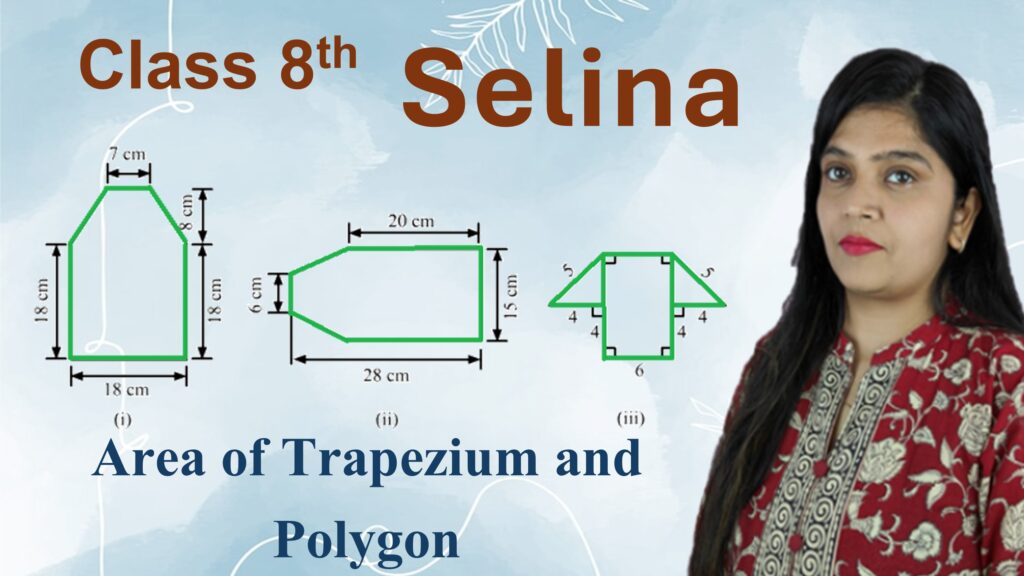Exercise: 4-D
Multiple Choice Questions
Q1: If 42*8 is a multiple of 9, then the digit represented by * is
Step 1: For a number to be divisible by 9,
→ The **sum of its digits** must be a multiple of 9 ✅
Let the number be:
→ \( 42*8 \) → Digits: 4, 2, *, 8
Step 2: Add known digits:
→ 4 + 2 + * + 8 = 14 + *
We want:
\[
14 + * \equiv 0 \ (\text{mod } 9)
\]
Try values of * from the options:
→ If * = 0 → 14 + 0 = 14 ❌ (Not divisible by 9)
→ If * = 1 → 14 + 1 = 15 ❌
→ If * = 2 → 14 + 2 = 16 ❌
→ If * = 4 → 14 + 4 = 18 ✅ (Divisible by 9)
Step 3: Check:
→ 4 + 2 + 4 + 8 = 18 ✅
→ 18 ÷ 9 = 2 ✅
So, the number 4248 is divisible by 9 ✅
Answer: d. 4
Q2: Consider the following statements:
i. In a given whole number, if the sum of the numbered digits is equal to the sum of even numbered digits, then the number is divisible by 11.
ii. In a given whole number, if the difference of sums of odd numbered digits and even numbered digits is divisible by 11,then the number is divisible by 11. Of these statements
Step 1: Recall the **divisibility rule for 11**:
→ If the **alternating sum** of the digits (odd – even + odd – even…) is divisible by 11, then the number is divisible by 11 ✅
That is:
\[
(d_1 – d_2 + d_3 – d_4 + \ldots) \equiv 0 \pmod{11}
\]Step 2: Analyze the statements:
→ (i) talks about **sum of odd digits = sum of even digits**, so the diference of both the sums is 0 which is divisible by 11 ✅
→ (ii) correctly describes the rule — difference of the sum of digits at **odd and even positions** divisible by 11 ⇒ number divisible by 11 ✅
Answer: b. both (i) and (ii) are correct
Q3: The number 12345674 is divisible by
Step 1: Check divisibility by 3
→ Sum of digits = 1 + 2 + 3 + 4 + 5 + 6 + 7 + 4 = 32
→ 32 is not divisible by 3
→ So, **not divisible by 3** ❌
Step 2: Check divisibility by 5
→ Last digit is 4
→ Numbers ending with 0 or 5 are divisible by 5
→ So, **not divisible by 5** ❌
Step 3: Check divisibility by 9
→ Sum of digits = 32 (from Step 1)
→ 32 is not divisible by 9
→ So, **not divisible by 9** ❌
Step 4: Check divisibility by 11
→ Sum of digits in odd positions: 1 + 3 + 5 + 7 = 16
→ Sum of digits in even positions: 2 + 4 + 6 + 4 = 16
→ Difference = 16 − 16 = 0
→ Since 0 is divisible by 11, the number is divisible by 11 ✅
Answer: d. 11
Q4: What least value must be assigned to * so that the number 9187682 is divisible by 8?
Step 1: Divisibility rule of 8
→ A number is divisible by 8 if its last **3 digits** form a number divisible by 8.
Step 2: Last 3 digits of the number
→ The last 3 digits are: 6 8 * → “68*”
→ Possible numbers: 681, 682, 683, 684
Step 3: Check each option
→ 681 ÷ 8 = 85.125 ❌
→ 682 ÷ 8 = 85.25 ❌
→ 683 ÷ 8 = 85.375 ❌
→ 684 ÷ 8 = 85.5 ❌
Wait, none is divisible? Let me recheck carefully.
Because the question states the number as **9187682** and * replaces the last digit (the 7th digit). So the number is 918768*
Hence last 3 digits: 6, 8, *
Try values for *:
681, 682, 683, 684, 685, 686, 687, 688, 689
Let’s check 688:
→ 688 ÷ 8 = 86 (exact) ✅
So, least * that makes last 3 digits divisible by 8 is 8
But options only up to 4 — 8 is not an option
Check the question carefully:
Is the given number 9187682 or 918768* (7 digits or 8 digits?)
Assuming question is “918768*” — then options a=1, b=2, c=3, d=4
Check last 3 digits for * = 4 → 684
→ 684 ÷ 8 = 85.5 ❌
For * = 2 → 682 ÷ 8 = 85.25 ❌
None works for options given.
Is it possible the question means **91876*2**?
Last 3 digits = *2 (e.g. 6 * 2)
If so, last three digits: 7 * 2
Let me check divisibility by 8 using last 3 digits from options:
Try * = 1: last 3 digits = 6 1 2 = 612
612 ÷ 8 = 76.5 ❌
* = 2: 6 2 2 = 622 ÷ 8 = 77.75 ❌
* = 3: 6 3 2 = 632 ÷ 8 = 79 ✔️ (79 × 8 = 632)
* = 4: 6 4 2 = 642 ÷ 8 = 80.25 ❌
So, * = 3 works.
Answer: c. 3
Q5: The number 111,111,111,111 is divisible by
Step 1: Check divisibility by 3
→ Sum of digits = 1×12 = 12
→ 12 is divisible by 3
→ So, divisible by 3 ✅
Step 2: Check divisibility by 5
→ Last digit = 1
→ Divisible by 5 if last digit is 0 or 5
→ Not divisible by 5 ❌
Step 3: Check divisibility by 9
→ Sum of digits = 12 (from Step 1)
→ 12 is not divisible by 9
→ Not divisible by 9 ❌
Step 4: Check divisibility by 11
→ Sum of digits at odd places = 1 + 1 + 1 + 1 + 1 + 1 = 6
→ Sum of digits at even places = 1 + 1 + 1 + 1 + 1 + 1 = 6
→ Difference = 6 − 6 = 0, which is divisible by 11
→ So, divisible by 11 ✅
Answer: c. 3 and 11
Q6: What least value must be given to so that 97215*6 is divisible by 11?
Step 1: Divisibility rule for 11
→ A number is divisible by 11 if the difference between the sum of digits in odd positions and even positions is divisible by 11 (including 0).
Step 2: Number and positions
Number: 9 7 2 1 5 * 6
Positions (from right):
→ 6 (1st, odd), * (2nd, even), 5 (3rd, odd), 1 (4th, even), 2 (5th, odd), 7 (6th, even), 9 (7th, odd)
Step 3: Sum of digits at odd positions
= 6 + 5 + 2 + 9 = 22
Step 4: Sum of digits at even positions
= * + 1 + 7 = * + 8
Step 5: Difference
\[
\text{Difference} = \text{Sum of odd} – \text{Sum of even} = 22 – (* + 8) = 14 – *
\]This difference must be divisible by 11.
Step 6: Find least * such that 14 – * ≡ 0 (mod 11)
Check values:
→ For * = 1 → 14 – 1 = 13 (not divisible by 11)
→ For * = 2 → 14 – 2 = 12 (no)
→ For * = 3 → 14 – 3 = 11 (yes, divisible by 11)
→ For * = 5 → 14 – 5 = 9 (no)
Answer: c. 3
Q7: In a 3-digit number, if the middle digit is equal to the sum of the other two digits, then it is a multiple of
Step 1: Let the 3-digit number be \( \overline{abc} \)
→ \( a \) = hundreds digit
→ \( b \) = tens digit
→ \( c \) = units digit
Given:
\[
b = a + c
\]Step 2: Express the number in expanded form
\[
\overline{abc} = 100a + 10b + c
\]
Substitute \( b = a + c \):
\[
= 100a + 10(a + c) + c = 100a + 10a + 10c + c = 110a + 11c
\]Step 3: Factor the expression
\[
110a + 11c = 11(10a + c)
\]This means the number is divisible by 11.
Answer: c. 11
Q8: Find the multiple of 11 in the following numbers.
Step 1: Recall divisibility rule for 11
→ A number is divisible by 11 if the difference between the sum of digits in odd positions and the sum of digits in even positions is divisible by 11 (including 0).
Let’s check each number:
a) 112144
Digits (from right): 4(1), 4(2), 1(3), 2(4), 1(5), 1(6)
Sum of digits at odd positions (1,3,5): 4 + 1 + 1 = 6
Sum of digits at even positions (2,4,6): 4 + 2 + 1 = 7
Difference = 7 – 6 = 1 (Not divisible by 11)
→ Not divisible by 11 ❌
b) 447355
Digits (from right): 5(1), 5(2), 3(3), 7(4), 4(5), 4(6)
Sum of digits at odd positions: 5 + 3 + 4 = 12
Sum of digits at even positions: 5 + 7 + 4 = 16
Difference = 16 – 12 = 4 (Not divisible by 11)
→ Not divisible by 11 ❌
c) 869756
Digits (from right): 6(1), 5(2), 7(3), 9(4), 6(5), 8(6)
Sum of digits at odd positions: 6 + 7 + 6 = 19
Sum of digits at even positions: 5 + 9 + 8 = 22
Difference = 22 – 19 = 3 (Not divisible by 11)
→ Not divisible by 11 ❌
d) 978626
Digits (from right): 6(1), 2(2), 6(3), 8(4), 7(5), 9(6)
Sum of digits at odd positions: 6 + 6 + 7 = 19
Sum of digits at even positions: 2 + 8 + 9 = 19
Difference = 19 – 19 = 0 (Divisible by 11)
→ Divisible by 11 ✅
Answer: d. 978626
Q9: What least value must be given to n that the number 6135n2 becomes divisible by 9?
Step 1: Divisibility rule for 9
→ A number is divisible by 9 if the sum of its digits is divisible by 9.
Step 2: Sum of digits
Digits: 6, 1, 3, 5, \( n \), 2
Sum = 6 + 1 + 3 + 5 + \( n \) + 2 = 17 + \( n \)
Step 3: Find least \( n \) such that \( 17 + n \) is divisible by 9
Multiples of 9 near 17: 18, 27, 36, …
Check:
– \( n = 1 \): 17 + 1 = 18 (divisible by 9) ✅
– \( n = 3 \): 17 + 3 = 20 (no)
– \( n = 4 \): 17 + 4 = 21 (no)
So, the least value of \( n \) is 1.
Answer: a. 1
Q10: The number 715938* is divisible by 4. The unknown non-zero digit marked as * will be
Step 1: Divisibility rule for 4
→ A number is divisible by 4 if the last two digits form a number divisible by 4.
Step 2: Last two digits of the number
→ The last two digits are: 3* (3 followed by *)
→ Possible numbers: 32, 33, 34, 36
Step 3: Check each option
→ 82 ÷ 4 = 20.5 (not divisible) ❌
→ 83 ÷ 4 = 20.75 (not divisible) ❌
→ 84 ÷ 4 = 21 (divisible) ✅
→ 86 ÷ 4 = 21.50 (not divisible) ❌
Step 4: Choose the least non-zero digit
Between 2 and 6, the least is 2.
Answer: c. 4
Q11: Consider the following statements : The numbers 24984, 26784 and 28584 are
(i) divisible by 3 (ii) divisible by 4 (iii) divisible by 9
Which of these are correct?
Step 1: Check divisibility by 3
→ Sum of digits of 24984 = 2+4+9+8+4 = 27 (divisible by 3)
→ Sum of digits of 26784 = 2+6+7+8+4 = 27 (divisible by 3)
→ Sum of digits of 28584 = 2+8+5+8+4 = 27 (divisible by 3)
→ All three are divisible by 3 ✅
Step 2: Check divisibility by 4
→ Last two digits of 24984 = 84; 84 ÷ 4 = 21 (divisible)
→ Last two digits of 26784 = 84; divisible by 4
→ Last two digits of 28584 = 84; divisible by 4
→ All three are divisible by 4 ✅
Step 3: Check divisibility by 9
→ Sum of digits of each number = 27
→ 27 ÷ 9 = 3 (divisible)
→ All three numbers are divisible by 9 ✅
Answer: d. (i), (ii) and (iii)
Q12: How many of the following numbers are divisible by 3 but not by 9?
2133, 2343, 3474, 4131, 5286, 5340, 6336, 7347, 8115, 9276
Step 1: Divisibility rules
– Divisible by 3: Sum of digits divisible by 3
– Divisible by 9: Sum of digits divisible by 9
We will check each number:
1) 2133
Sum of digits = 2 + 1 + 3 + 3 = 9
→ Divisible by 3 and 9 (excluded)
2) 2343
Sum = 2 + 3 + 4 + 3 = 12
→ Divisible by 3 but not by 9 (since 12 % 9 ≠ 0)
3) 3474
Sum = 3 + 4 + 7 + 4 = 18
→ Divisible by 3 and 9 (excluded)
4) 4131
Sum = 4 + 1 + 3 + 1 = 9
→ Divisible by 3 and 9 (excluded)
5) 5286
Sum = 5 + 2 + 8 + 6 = 21
→ Divisible by 3 but not by 9
6) 5340
Sum = 5 + 3 + 4 + 0 = 12
→ Divisible by 3 but not by 9
7) 6336
Sum = 6 + 3 + 3 + 6 = 18
→ Divisible by 3 and 9 (excluded)
8) 7347
Sum = 7 + 3 + 4 + 7 = 21
→ Divisible by 3 but not by 9
9) 8115
Sum = 8 + 1 + 1 + 5 = 15
→ Divisible by 3 but not by 9
10) 9276
Sum = 9 + 2 + 7 + 6 = 24
→ Divisible by 3 but not by 9
Step 2: Count numbers divisible by 3 but not by 9
Numbers: 2343, 5286, 5340, 7347, 8115, 9276 → 6 numbers
Answer: b. 6
Q13: If the number 357*25* is divisible by both 3 and 5, then the missing digits in the units place and the thousands place respectively are
Step 1: Understand the number
Number: 3 5 7 * 2 5 *
Positions: (from left)
– Thousand’s place = 4th digit = * (unknown digit)
– Units place = last digit = * (unknown digit)
Step 2: Divisibility by 5
→ For divisibility by 5, the units digit must be 0 or 5.
→ So, units digit = 0 or 5
Step 3: Divisibility by 3
→ Sum of digits must be divisible by 3.
→ Known digits: 3 + 5 + 7 + 2 + 5 = 22
→ Let the missing digits be \( x \) (thousands place) and \( y \) (units place).
→ Total sum = 22 + \( x + y \)
Check options:
– Option a: units = 0, thousands = 2 → sum = 22 + 2 + 0 = 24 (divisible by 3) ✅
– Option b: units = 0, thousands = 6 → sum = 22 + 6 + 0 = 28 (not divisible by 3) ❌
– Option c: units = 5, thousands = 1 → sum = 22 + 1 + 5 = 28 (not divisible by 3) ❌
– Option d: units = 5, thousands = 4 → sum = 22 + 4 + 5 = 31 (not divisible by 3) ❌
Answer: a. 0, 2
Q14: 3-3+3-3+…… 101 terms =?
Step 1: Identify the pattern
The series is: 3, -3, 3, -3, 3, -3, … alternating between +3 and -3.
Step 2: Sum of terms in pairs
Each pair of two terms is:
\[
3 + (-3) = 0
\]
Number of pairs in 101 terms:
\[
\frac{101 – 1}{2} = 50 \text{ pairs} + 1 \text{ extra term}
\]Step 3: Sum of 100 terms (50 pairs)
Sum of 50 pairs = \(50 \times 0 = 0\)
Step 4: Add the last (101st) term
The 101st term is the first term of the pattern (since terms alternate), so it is \(+3\).
Sum total = 0 + 3 = 3
Answer: c. 3
Q15: If m, n, p be the digits number beginning from the left, the number is
Step 1: Understand place values
→ \( m \) is the hundreds digit (leftmost)
→ \( n \) is the tens digit (middle)
→ \( p \) is the units digit (rightmost)
Step 2: Write the number in expanded form
\[
\text{Number} = 100 \times m + 10 \times n + p
\]Option (d) matches the expanded form.
Answer: d. \(100m + 10n + p\)
Q16: If x and y are both odd numbers, which f the following is an even number?
Step 1: Properties of odd and even numbers
– Odd + Odd = Even
– Odd × Odd = Odd
– Even + Odd = Odd
Step 2: Check each option
a) \( x + y \)
→ Odd + Odd = Even
→ \( x + y \) is even ✅
b) \( x + y + 1 \)
→ (Odd + Odd) + 1 = Even + 1 = Odd
→ Not even ❌
c) \( xy + 2 \)
→ \( xy = \) Odd × Odd = Odd
→ Odd + 2 (even) = Odd + Even = Odd
→ Not even ❌
d) \( xy \)
→ Odd × Odd = Odd
→ Not even ❌
Answer: a. \( x + y \)
Q17: If (p-1) is an odd number, what are the two other numbers nearest to it?
Step 1: Understand \((p – 1)\)
→ \((p – 1)\) is odd.
→ So, \((p – 1)\) is the given odd number.
Step 2: Find the nearest numbers to \((p – 1)\)
→ Nearest numbers to \((p – 1)\) are those just before and after it:
– Number before: \((p – 1) – 2 = p – 3\) (subtract 2 because consecutive odd numbers differ by 2)
– Number after: \((p – 1) + 2 = p + 1\)
Step 3: Verify with options
Option (c) matches the numbers \( p – 3 \) and \( p + 1 \).
Answer: c. \( p – 3, p + 1 \)
Q18: Find the missing number in the following addition problem:
8 3 5
4 * 8
+ 9 * 4
----------
2 2 * 7
i. Let the missing digit be denoted by xStep 1: Start with the **units column**.
Add the digits in the units column (rightmost):
\[
5 + 8 + 4 = 17
\]
So, units digit of sum = 7 ✅
Carry = 1 to the tens column
Step 2: Now move to the **tens column**.
Digits in tens place: \(3 + x + x + 1 \text{ (carry)}\)
\[
3 + x + x + 1 = 2x + 4
\]
This must give a digit ending in \(*\) from the result 2 2 * 7 (tens digit is missing, we must match).
So try each option:
– Option a: x = 0 → \(3 + 0 + 0 + 1 = 4\) → ends in 4 ❌
– Option b: x = 4 → \(3 + 4 + 4 + 1 = 12\) → ends in 2 ❌ → carry = 1
– Option c: x = 6 → \(3 + 6 + 6 + 1 = 16\) → ends in 6 ✅ → carry = 1
– Option d: x = 9 → \(3 + 9 + 9 + 1 = 22\) → ends in 2 ❌ → carry = 2 ❌ (will affect next column)
So only x = 6 gives correct units digit and carry = 1 for hundreds place ✅
Step 3: Check the **hundreds column**.
Digits: \(8 + 4 + 9 + 1 \text{ (carry)} = 22\) → result: 2 ✅ and carry = 2
Thousands column: carry = 2 → matches thousands digit in result ✅
i. Final check:
All digits align and match perfectly with option **x = 6**.
Answer: c. 6
Q19: What number should replace M in the following multiplication problem?
3 M 4
× 4
----------
1 2 1 6
Step 1: Let the number be \( 3 M 4 \)
→ The number = \(300 + 10M + 4 = 304 + 10M\)
Step 2: Multiply by 4
\[
4 \times (304 + 10M) = 1216
\]
\[
1216 = 4 \times 304 + 4 \times 10M = 1216 + 40M
\]Wait, that cannot be because 4 × 304 = 1216 already. So, no room for \( M \). So the \( M \) must be 0.
Step 3: Verify by substituting \( M = 0 \)
Number = 304
Multiply by 4:
\[
304 \times 4 = 1216
\]
Matches the product exactly.
Answer: a. 0






Leave a Comment